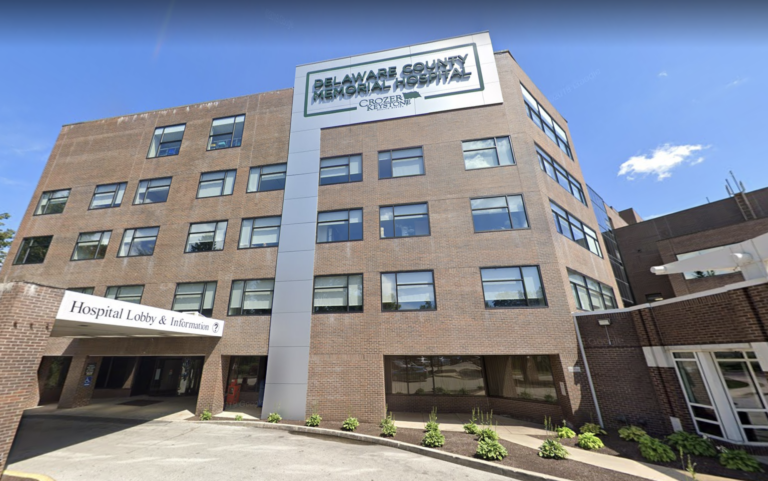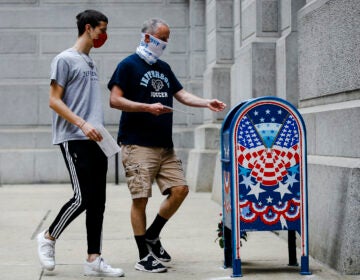Pennsylvania’s hospitals are in crisis. How will Shapiro, Mastriano address this growing issue?
The bills created to save Pennsylvania’s hospitals will likely die in Harrisburg. Pennsylvania’s new governor could have the power to revive them.
Listen 2:00
Delaware County Memorial Hospital. (Google Maps)
Ask us: As Election Day draws near, what questions do you have?
Hahnemann University Hospital’s closure back in 2019 left shockwaves in Philadelphia and was a sign of worsening things to come.
Chester County kicked off 2021 with five hospitals. In less than a year, the rural county was down to just three, which has led to hospital diversion — crowded emergency departments and long ambulance rides.
Meanwhile, Crozer Health, a four-hospital system in Delaware County, has gutted itself. As a judge currently mulls over whether the company can shut down Delaware County Memorial Hospital, many in the community are wondering how it got to this point.
It turns out Pennsylvania’s lack of regulation has left communities across the state vulnerable to hospital closures.
Lawmakers representing Delaware County introduced a historic package of bills back in June aimed to protect the Pennsylvanians from actions by for-profit health care.
“The issue that we’ve been running into is that we can’t seem to get Republicans to really either acknowledge this or understand the gravity of it all. And it’s a little frustrating, because it’s not just a southeast Delco issue. It’s an issue across the whole commonwealth,” state Sen. Tim Kearney said.
The bills have not gotten a hearing, let alone a vote in the General Assembly and they will likely die at the end of this session.
“What we’ll do is reintroduce them next session in Harrisburg,” said state Rep. Mike Zabel. “There will be a new governor and the composition of the legislature will be different in some way or another, but we will continue to press this legislation.”
The gubernatorial candidate who wins in November will likely have his hands full with hospital-related issues. Republican candidate Doug Mastriano did not respond to multiple requests for comment. In his role as state attorney general, Democratic candidate Josh Shapiro said that he is well-read on the issue and views it as a priority.
Shapiro: There is a ‘crisis of access’
“Access is critically important. It’s one of the reasons why, after multiple attorneys general and governors tried to resolve a major health care dispute in western Pennsylvania, I stepped in and resolved it. I brought two healthcare giants — Highmark and UPMC — together, and as a result, saved access for 1.9 million people in western Pennsylvania,” Shapiro said.
Shapiro said that there is a “crisis of access.”
Five rural hospitals have closed in Pennsylvania since 2005, according to the University of North Carolina’s Sheps Center for Health Services Research.
Shapiro emphasized the need for expanded access to telemedicine, which Mastriano has also expressed support for in the past.
“Even in places where we have access to a healthcare institution, we’ve got a healthcare worker shortage right now, especially amongst our nurses. … and we’ve seen a significant impact here in Pennsylvania,” Shapiro said.
Delaware County’s ‘unique’ hospital situation
Speaking in generalities, Shapiro said he believes that these healthcare institutions are “cash-strapped” and that they are not getting enough support from the federal and, in some cases, state governments.
However, he called the situation in Delaware County “unique.”
Prospect Medical Holdings, Crozer’s parent company, has a history of taking millions from its health systems across the country.
Shapiro recently intervened in a lawsuit to keep Crozer and Prospect from shutting down Delaware County Memorial Hospital and transitioning it to a behavioral health center. The Foundation for Delaware County, which formed after Prospect acquired Crozer in 2016 and transitioned it from nonprofit to for-profit, is accusing the company of abandoning a previous agreement.
The Foundation is arguing that Prospect agreed to keep acute care services at its four hospitals open for a period of no less than 10 years. The group has the support of the county and now the attorney general.
“My office will do everything in our power to force Prospect to live up to their commitment that they made to keep that hospital open until at least the year 2026,” Shapiro said.
Zabel applauded Crozer for investing in behavioral health, but he doesn’t believe that it should come at the expense of emergency health services for eastern Delco and West Philadelphia.
“I’m aware of the challenges of getting Delaware County Memorial Hospital back up and running fully. And I understand that may take time, but the emergency department is an absolute must. We need that in the area. I think that if we were to lose that it would have a discernible effect on health outcomes in the area,” Zabel said.
Shapiro: Regulations are ‘not strong enough and not enforced’ uniformly
Pennsylvania is one of just a little more than a dozen states nationwide that does not have certificate of need regulations for handling hospital acquisitions and closures.
Shapiro said that Pennsylvania does have certain regulations in place, but in some cases they are quite weak. Additionally, the regulatory powers are split between two offices.
The state Office of the Attorney General oversees charities and nonprofits, while the state Department of Health governs for-profit healthcare operators.
“That’s under the governor’s authority. And I would argue there, the regulations are just simply not strong enough and not enforced, sort of uniformly across the board,” Shapiro said. “I do think part of this has to be more aggressive enforcement by the governor’s administration. And there needs to be some review of our regulations to sort of decide where to house the authority, whether it’s going to be housed uniformly with the Attorney General’s office, or more uniformly with the governor’s office.”
Shapiro believes that there needs to be a conversation about who will lead the way in government in addressing issues because right now, he said, “it’s just not working effectively.”
“Too many of these wealthy hospitals, execs, and owners are able to compromise public health and patient safety in the name of making an extra buck — and that’s just simply not acceptable,” Shapiro said.

Your go-to election coverage
WHYY is your source for fact-based, in-depth journalism and information. As a nonprofit organization, we rely on financial support from readers like you. Please give today.








